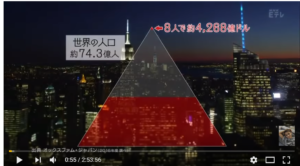Daily Meditations for Every Life
Marianne Williamson

A Politics of Love
A Politics of Love
A Handbook for A New American Revolution
Marianne Williamson
Free Copy (Chapter 2) from here – English
Free Copy (Chapter 2) from here – Japanese
Dr. Ravi Batra
Dr. Batra Discusses the New Book with Andrew Mazzone:
Ever since the Great Recession that started in 2007, the United States has been mired in poverty, joblessness and a mountain of debt. With Congress and the president constantly at odds, the public is clamoring for a fresh approach to our economic problems, and this book delivers just that. Even the fastest growing economies of India and China have seen a slowdown and the analysis and the solutions offered in this book, while based mostly on American experience, actually apply to the whole world. Salient features of the book are:
1. The main cause of our myriad troubles is monopoly capitalism, which is a system dominated by giant companies that charge high prices, pay low wages and extract huge productivity from employees. This way supply rises faster than demand and generates layoffs; so the solution lies in breaking up the behemoths and returning to free markets, where small firms engage in price and quality competition.
2. That requires new legislation and the cooperation of Congress, which itself is either divided or beholden to monopoly capitalists. So we can’t count on the legislature.
3. The president can bring about a competitive-capitalism effect, though not actual free markets, without recourse to Congress.
4. A competitive-capitalism effect occurs when, through certain official proclamations or policies, a market arrives at a similar outcome that would prevail in the presence of small firms operating as competitive enterprises.
5. With the help of the agencies such as the FDIC and the CFTC that work for him, the president can bring about this effect in several industries including banking, oil and gasoline, pharmaceuticals as well as foreign trade
6. The FDIC has the legal authority to start its own bank, which could compete with banking giants and bring down interest rates on credit card balances from the current range of 15 – 30 percent to just 5 percent.
7. The CFTC canlegally raise margin requirements for oil futures to control speculation and bring petrol price down to $20 per barrel from the triple digit levels that prevailed until mid-2014,in spite of a relentless decline in American petroleum imports. In 1998 even a puny fall in these imports brought oil down to just $12 per barrel.
8. The president and the Federal Reserve should and can eliminate our trade deficit by doing what China and Japan do; he can offer an export-oriented exchange rate to raise our exports to the level of our imports, so that we follow a policy of balanced free trade.
9. The rural areas of emerging economies, such as India, China and Brazil, should use a putting-out system of industrialization that was very effective in eliminating poverty in pre-capitalist Europe and the United States. This system required little investment but quickly uplifted living standards in small towns and remote villages. With these type of measures, nations can not only get rid of unemployment, but they can also make a big dent in poverty, especially rural poverty. Similarly, consumer and federal debt can also be brought down, even though slowly. Economies can then become self sustaining without the government’s life support.
Face to Face with Prof. Dr. Ravi Batra, Renowned Economist – SMU Desiplaza, Dallas, Texas
Prof. Ravi Batra interviewed at DesiPlaza Studio on Jan 08th, 2017 with the host.
ラビ・バトラ(Ravi Batra、1943年6月27日 – )はアメリカ合衆国の経済学者、サザンメソジスト大学(Southern Methodist University)の教授である。本名はRaveendra N. Batra。パキスタンの古都ムルターン近郊に生まれる。家族はパキスタンのインドからの分離時にデリー近郊に移り住み、父はサンスクリット語の教授であった。デリー大学卒業後の1969年に渡米し、米国サザンイリノイ大学で博士号を取得した。
青年時代から哲学者であるサーカーを師とし、彼はサーカーが1959年に提唱した進歩的活用理論(PROUT=プラウト理論)を継承する一人である。
資本主義崩壊後に誕生する経済社会システム、とラビ・バトラが予測している「プラウト主義経済」とは、大まかに言えば均衡貿易、賃金格差の縮小、均衡財政、自国産業保護、終身雇用、環境保護、銀行規制等による「所得格差の少ない安定した共存共栄の社会」のことを指す。彼は1960年代から1970年代前半にかけての日本社会がプラウト主義経済に最も近い理想的な社会だったと述べており、当時「一億総中流社会」を実現していた日本を絶賛している。彼は恩師サーカーと同様に、数々の著書で「必ずやプラウト主義経済は過去に一億総中流社会を実現していた日本から始まるだろう。」と述べている。
Source: Wikipedia
欲望の経済史2018 ルールが変わる時 全話 – NHK Eテレ
World Top 8 People’s Total Assets = Total Assets of 3.6 Billion People (1/2 World Population)

World Total Assets
Mr. Boyan Slat
How the oceans can clean themselves: Boyan Slat at TEDxDelft
 English
English 日本語
日本語